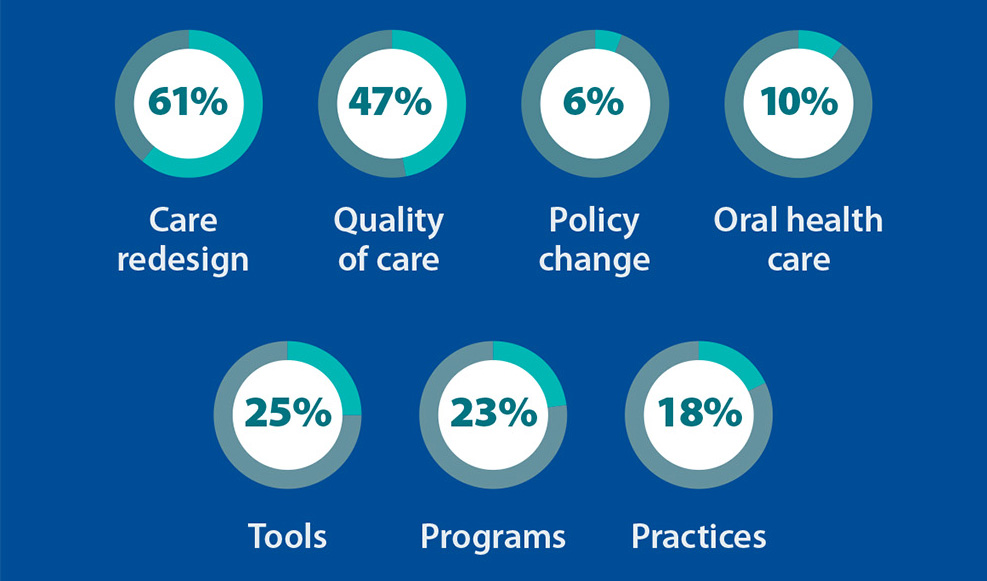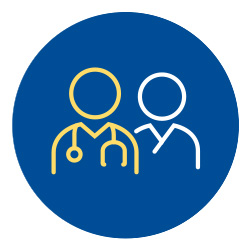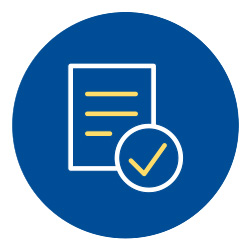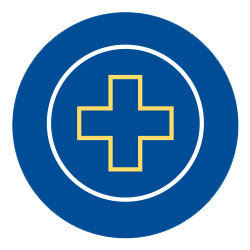Embedded Clinician Salary Awards (ECRA)
Executive Summary of Final Reports (May 2015 to April 2021)
Executive Summary
The Embedded Clinician Researcher Salary Award (ECRA) program was designed to support original research on innovative models of health care delivery, build capacity for research excellence, and translate evidence for uptake into practice and policy. The 20 ECRA awardees partnered with 20 health system organizations (e.g., hospital, provincial health authorities) to develop research capacity and leadership for transformative change in community-based primary health care and made notable contributions in supporting the creation of Learning Health SystemsFootnote 1. The ECRA program was a key component of the CIHR Community Based Primary Health Care (CBPHC) Signature Initiative. The summary below highlights the awardees’ impacts and outputs during the program funding period of May 2015 to April 2021, as reported in their final reports (18 respondents, out of 20 funded awardees). Their reported impacts are grounded in the Canadian Health Services and Policy Research Alliance (CHSPRA) Impact frameworkFootnote 2.
Health System Interventions

Health System Interventions: Long description
The most prioritized research target areas were care redesign (61%), quality of care (47%), policy change (6%), and oral health care (10%). A total of 44 cumulative interventions were developed in these target areas, most commonly: tools (25% of 44 interventions), programs (23%) or practices (18%); and were at various stages of development, i.e., implemented (39%), tested/piloted (20%) or spread or scaled-up (18%), suggesting a trend in the implementation science approaches.
Improving Health Equity

There was a strong focus in the CBPHC Signature initiative to include and engage historically excluded groups and/or those at-riskFootnote 3 of receiving poor access to care. The ECRA research programs were not an exception, and worked to advance health equity in the following groups/populations/settings (non-exhaustive list):
- Adults living with drug addiction and substance use
- Older adults undergoing care transitions, particularly hospital discharge
- Perinatal support program in rural and remote areas and in Indigenous settings
- Overcoming ethnicity-based barriers to seeking and receiving care
- Adequate housing or outreach care to achieve stable health for at-risk populations
Summary of the ECRAs’ Impacts
Grounded in CHSPRA’s impact frameworkFootnote 2
-

-
Building capacity involved:
- $18M from CIHR
- $20M from 20 health system partners
- 4 funding pools, including one in oral health care and three geographic (Eastern, Western, Central Canada)
- Supporting 20 Clinician-Researchers for 4 years
- Engaging 514 stakeholders, including 184 trainees mentored, 86 research staff, 83 healthcare providers, 38 policy-makers, and 113 community & patient partners.
-

-
Producing evidence led to:
- 165 publications, including 151 academic articles, 3 book chapters & 9 reports
- 2 Intellectual properties developed
- 118 media articles written & media interviews given (in Canada and internationally)
-

-
Informing decision-making on health services & policy innovation resulted in:
- 17 Impact Stories describing the impacts of the awardees’ work on informing policy, practice, funding and improving health care delivery, system performance and equity
- 42 invited presentations to knowledge users, policy makers & general public, with key outputs (e.g., informing practice & policy or successfully promoting the spread & scale of tested interventions to different settings).
-

-
Improved health system performance & health equity, through:
- 44+ interventions implemented, tested, spread and scaled up in the Canadian health system
- Perinatal support program in remote communities; improved access to care in under-served regions, to low-income families & many more.
Outputs and Outcomes
A total of 42 key non-academic presentations were given by the awardees to an audience of decision-makers and policy-makers. The resulting impacts of these engagements included: informing/changing practice, informing policy-making and/or funding decisions, or successfully promoting the scale-up, spread and/or expansion of the tested/implemented intervention.
Contextual factors that hindered/facilitated research activities, innovation and spread & scale
- Enablers included: strength of quadripartite partnerships and leadership, partnerships with clinical networks and clinical teams; the use of technology (virtual care, informatic systems) facilitating uptake of the interventions developed.
- Barriers included: changes in the health system (local and provincial), turnover and limitations in human resources; lengthy ethics procedures; resistance to change; limited access to data; non-interoperable clinical data systems (i.e., EMRs) which prevented the scale up of the intervention to other sites/settings; the lack of policy, investments and/or societal interest in the specific topic area (e.g., oral health care); the slow nature of uptake of evidence into practice; and challenges working with community partners.
- The ripple effect of the COVID-19 pandemic in clinical and research areas was cited as both a barrier (i.e., increased clinical duties of awardees, delays in research outputs, overwhelmed health system with other priorities) and a facilitator (agile response, including rapid uptake of virtual care).
Value-add of This Program
The ECRA awardees cited the following value-adds of the award:
- Enhancing professional career paths and profiles
- Embeddedness resulting in direct positive impacts on health system performance and health equity
- Advancing Learning Health Systems and health services and policy research priorities
- Fostering impactful partnerships with health system decision-makers (e.g., creation of opportunities for an ECRA awardee to become a decision-maker within a provincial health authority)
- Facilitating further leveraging of research funds
For more information: Please contact Dr. Bahar Kasaai, at bkasaai.ihspr@ices.on.ca
- Date modified: